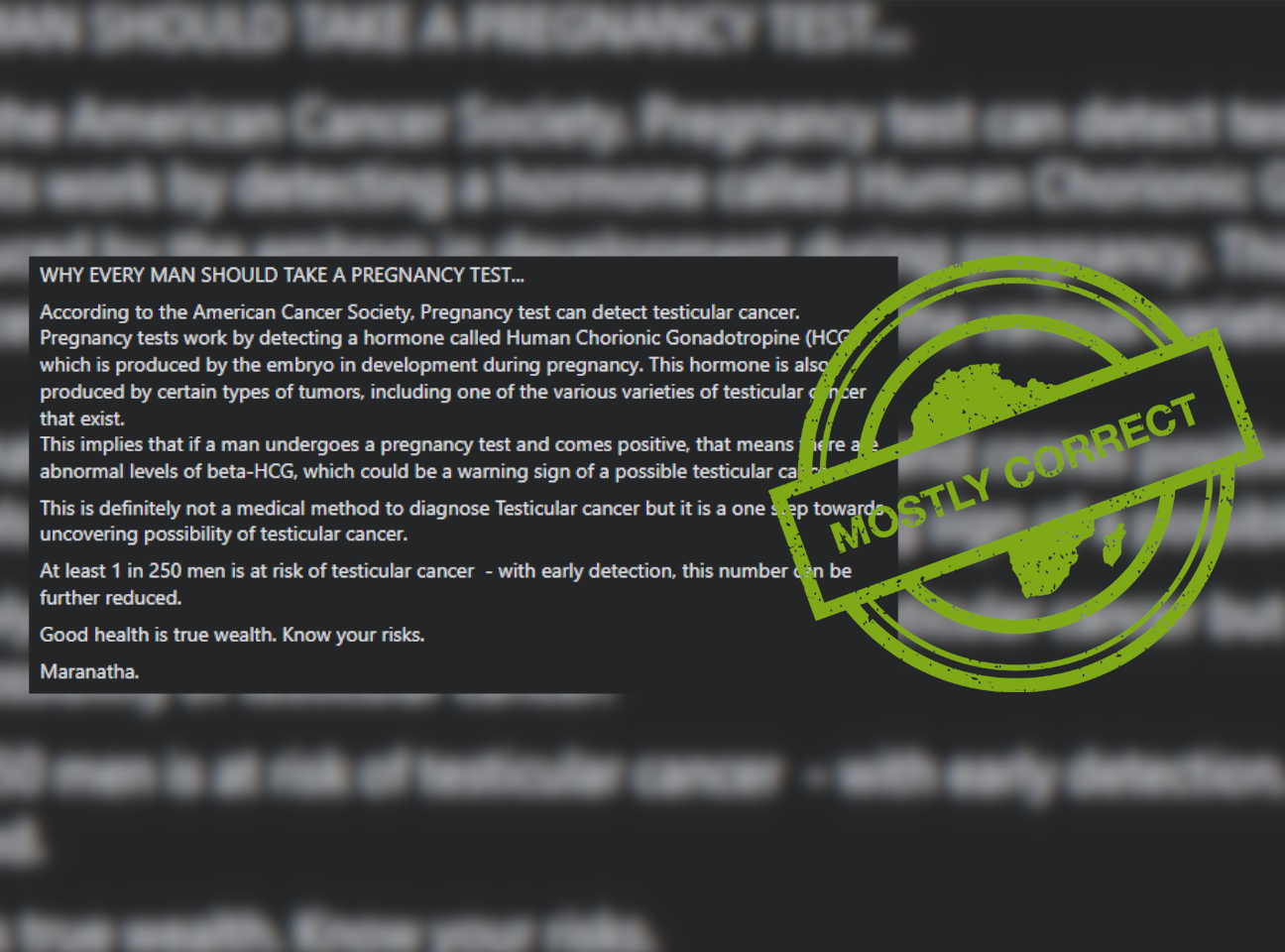IN SHORT: A claim that a positive home pregnancy test in men could indicate signs of testicular cancer is true. However, it's important to be aware that a negative pregnancy test does not eliminate the possibility of this type of cancer. Experts recommend seeking a diagnosis from a healthcare professional for a conclusive diagnosis.
A Facebook post claims that a home pregnancy test can detect testicular cancer, citing the American Cancer Society.
The claim, which has been circulating in South Africa since June 2023, has attracted hundreds of reactions from social media users, many of them incredulous.
Other users thanked the poster for the information. "It will sure go a long way for early detection, keep up the good work we are learning," wrote one user.
The post goes on to explain how this is possible. “Pregnancy tests work by detecting a hormone called Human Chorionic Gonadotropine (HCG), which is produced by the embryo in development during pregnancy. This hormone is also produced by certain types of tumors, including one of the various varieties of testicular cancer that exist," it says.
Therefore, according to the post, "if a man undergoes a pregnancy test and comes positive, that means there are abnormal levels of beta-HCG, which could be a warning sign of a possible testicular cancer".
The post cautions that this method is not a replacement for medical testing for testicular cancer, but "is one step towards uncovering possibility of testicular cancer".
The same claim appears here, here and here and was flagged as potentially false by Meta's third-party fact-checking programme. Meta is the company that owns Facebook. But is this claim accurate?

How home pregnancy tests work
Home pregnancy tests look for a hormone called human chorionic gonadotropin (hCG) in your urine. It is the hormone produced by a pregnant person’s placenta (an organ that develops in the uterus during pregnancy and is responsible for protecting the baby).
HCG is also produced by some types of tumours in men.
An article published in the American Journal of Emergency Medicine in 2013 explained that in some war zones, where traditional means of testing for testicular cancer were not readily available, pregnancy tests were used as a first intervention "to assist with the diagnosis".
If high levels of hCG are found in a man's urine, the 2013 article notes that this is "highly concerning" because some cancers produce hCG.
However, the article also notes that not all testicular malignancies produce hCG and a negative pregnancy test result does not rule out the possibility that a man has testicular cancer.
Home pregnancy tests can provide some clues
Fact-checking a similar claim in 2019, Cancer Research UK's head information nurse, Martin Ledwick, told Full Fact that relying on a pregnancy test to self-diagnose testicular cancer is not recommended.
Because not all testicular cancers produce hCG, "someone could get false reassurance from a negative test".
HCG in a man’s body can also be high for other reasons including male hypogonadism, a condition in which the body does not produce enough testosterone. This is according to a 2021 fact check by Health Feedback, a worldwide network of scientists sorting fact from fiction in health and medical media coverage.
So while home pregnancy tests can be used as a first step in detecting disease, only a healthcare professional can make a definitive diagnosis.
Republish our content for free
For publishers: what to do if your post is rated false
A fact-checker has rated your Facebook or Instagram post as “false”, “altered”, “partly false” or “missing context”. This could have serious consequences. What do you do?
Click on our guide for the steps you should follow.
Publishers guideAfrica Check teams up with Facebook
Africa Check is a partner in Meta's third-party fact-checking programme to help stop the spread of false information on social media.
The content we rate as “false” will be downgraded on Facebook and Instagram. This means fewer people will see it.
You can also help identify false information on Facebook. This guide explains how.


Add new comment